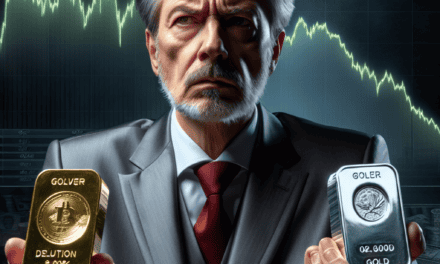“Insider Caution: Navigating the Hype Beyond Tesla’s Trillion-Dollar Dreams.”
Introduction
Insider selling of Tesla stock, despite ambitious valuation claims by prominent figures like Cathie Wood and Elon Musk, has raised eyebrows among investors and market analysts. This phenomenon can be attributed to several factors, including profit-taking after significant stock price appreciation, diversification of personal investment portfolios, and potential concerns about market volatility or company-specific risks. While Wood and Musk have projected a bold $7 trillion valuation for Tesla, insiders may have different perspectives on the company’s future growth trajectory or may simply be capitalizing on current high valuations. Understanding the motivations behind insider selling is crucial for investors trying to gauge the confidence levels of those closest to the company’s operations and strategic direction.
Insider Selling Trends: Understanding the Motivations Behind Tesla Stock Sales
In recent months, the financial world has been abuzz with discussions surrounding Tesla, Inc., particularly following bold valuation claims by prominent figures such as Cathie Wood and Elon Musk. Wood, the CEO of ARK Invest, and Musk, Tesla’s CEO, have both suggested that Tesla could reach a staggering $7 trillion market capitalization in the future. Despite these optimistic projections, a notable trend has emerged: insiders are selling Tesla stock. This phenomenon has raised questions about the motivations behind these sales and what they might indicate about the company’s future.
To begin with, insider selling is not an uncommon occurrence in the stock market. Executives and other insiders often sell shares for a variety of reasons, many of which are unrelated to the company’s performance or future prospects. For instance, insiders may sell stock to diversify their personal investment portfolios, meet tax obligations, or fund personal expenses. Therefore, it is crucial to consider these factors before drawing conclusions about the implications of insider sales.
However, the timing and scale of insider selling can sometimes provide insights into the insiders’ perspectives on the company’s valuation. In Tesla’s case, the recent wave of insider sales has coincided with a period of significant stock price volatility. This has led some analysts to speculate that insiders might be capitalizing on the high stock prices to lock in profits. While this is a plausible explanation, it is essential to recognize that insider sales do not necessarily reflect a lack of confidence in the company’s long-term potential.
Moreover, the context of Tesla’s ambitious growth plans and market positioning should be considered. Tesla has been at the forefront of the electric vehicle revolution, and its leadership in this sector has been a key driver of its stock price appreciation. The company’s expansion into energy solutions and autonomous driving technology further underscores its potential for future growth. Nevertheless, these ventures also come with inherent risks and uncertainties, which might influence insiders’ decisions to sell shares.
In addition to individual motivations, regulatory requirements can also play a role in insider selling. Executives are often subject to trading windows and blackout periods, which restrict when they can buy or sell shares. As a result, insiders may choose to sell shares during permissible periods, regardless of market conditions or future outlooks. This regulatory framework ensures transparency and fairness in the market, but it can also lead to misinterpretations of insider transactions.
Furthermore, it is important to consider the broader market environment when analyzing insider selling trends. The stock market has experienced heightened volatility due to macroeconomic factors such as inflation concerns, interest rate fluctuations, and geopolitical tensions. These external factors can impact investor sentiment and influence insiders’ decisions to sell shares as a precautionary measure.
In conclusion, while insider selling at Tesla has garnered attention, it is essential to approach this trend with a nuanced understanding of the various motivations and factors at play. Insiders may sell shares for personal financial reasons, regulatory compliance, or as a strategic response to market conditions. Therefore, it would be premature to interpret these sales as a definitive signal of insiders’ lack of confidence in Tesla’s future. Instead, investors should consider a comprehensive analysis of the company’s fundamentals, growth prospects, and market dynamics to make informed decisions.
Evaluating Cathie Wood’s $7 Trillion Valuation Claim for Tesla
Cathie Wood, the renowned CEO of ARK Invest, has made headlines with her bold prediction that Tesla could achieve a $7 trillion market valuation by 2027. This ambitious forecast, supported by Tesla’s CEO Elon Musk, has sparked both excitement and skepticism among investors and analysts alike. However, despite these optimistic projections, a notable trend has emerged: insiders are selling Tesla stock. This paradox raises questions about the underlying factors influencing these decisions and the credibility of such lofty valuation claims.
To understand the context of Cathie Wood’s $7 trillion valuation claim, it is essential to consider the factors driving her optimism. Wood’s bullish outlook is primarily based on Tesla’s potential to dominate the electric vehicle (EV) market, its advancements in autonomous driving technology, and its foray into energy solutions. She envisions Tesla not merely as an automaker but as a technology company poised to revolutionize multiple industries. The anticipated growth in EV adoption, coupled with Tesla’s innovative strides in battery technology and energy storage, forms the crux of her valuation thesis.
Moreover, Elon Musk’s ambitious vision for Tesla aligns with Wood’s projections. Musk has consistently emphasized Tesla’s commitment to innovation and its mission to accelerate the world’s transition to sustainable energy. His confidence in Tesla’s future prospects is reflected in the company’s aggressive expansion plans, including the development of new gigafactories and the introduction of groundbreaking products like the Cybertruck and the Tesla Semi. These initiatives are designed to bolster Tesla’s market position and drive long-term growth.
However, despite these optimistic forecasts, the recent trend of insider selling raises questions about the confidence of those closest to the company. Insider selling, while not uncommon, can be perceived as a signal that executives and key stakeholders may have concerns about the company’s future performance or stock valuation. It is important to note that insider selling can occur for various reasons, including personal financial planning, diversification of investment portfolios, or tax obligations. Nevertheless, the timing and volume of these transactions can influence investor sentiment and market perceptions.
One possible explanation for the insider selling trend is the current volatility in the stock market. Tesla’s stock price has experienced significant fluctuations, driven by broader market dynamics, regulatory challenges, and competitive pressures. Insiders may be capitalizing on the stock’s high valuation to secure profits amidst this uncertainty. Additionally, the broader economic environment, characterized by inflationary pressures and interest rate hikes, may be prompting insiders to adopt a more cautious approach.
Furthermore, while Cathie Wood’s $7 trillion valuation claim is compelling, it is not without its challenges. Achieving such a valuation would require Tesla to maintain its competitive edge, navigate regulatory hurdles, and successfully execute its ambitious growth plans. The EV market is becoming increasingly competitive, with traditional automakers and new entrants vying for market share. Tesla’s ability to sustain its leadership position will be crucial in realizing Wood’s projections.
In conclusion, while Cathie Wood’s $7 trillion valuation claim for Tesla is rooted in a compelling vision of the company’s future, the recent trend of insider selling introduces an element of caution. Investors must weigh the optimistic projections against the realities of market dynamics and competitive pressures. As Tesla continues to innovate and expand, its journey towards achieving such a valuation will be closely watched by both supporters and skeptics.
The Impact of Elon Musk’s Statements on Tesla’s Market Perception
Elon Musk, the charismatic CEO of Tesla, has long been a central figure in shaping the market perception of the electric vehicle giant. His bold claims and ambitious visions have often driven investor enthusiasm and market speculation. Recently, Musk, alongside prominent investor Cathie Wood, has made headlines with assertions that Tesla could achieve a staggering $7 trillion valuation in the future. Such declarations are not uncommon from Musk, who has a history of setting audacious targets that capture the imagination of investors and the public alike. However, despite these optimistic projections, a curious trend has emerged: insiders are selling Tesla stock. This phenomenon raises questions about the underlying factors influencing these decisions and the broader implications for Tesla’s market perception.
To understand the impact of Musk’s statements on Tesla’s market perception, it is essential to consider the context in which these claims are made. Musk’s projections often serve as a double-edged sword. On one hand, they inspire confidence and attract a wave of retail investors eager to capitalize on Tesla’s potential. On the other hand, they can lead to heightened scrutiny and skepticism from analysts and institutional investors who demand tangible evidence to support such lofty valuations. This dichotomy creates a volatile environment where market perception can swing dramatically based on Musk’s pronouncements and the company’s performance.
The decision by insiders to sell Tesla stock, despite the optimistic valuation claims, can be attributed to several factors. Firstly, insider selling is not inherently indicative of a lack of confidence in the company’s future. Insiders, including executives and board members, often sell shares for personal financial planning reasons, such as diversification or tax obligations. However, when insider selling occurs in conjunction with high-profile valuation claims, it can signal a more cautious outlook on the company’s near-term prospects. This caution may stem from the recognition that achieving a $7 trillion valuation requires overcoming significant challenges, including scaling production, maintaining technological leadership, and navigating regulatory landscapes.
Moreover, the timing of insider sales can also reflect a strategic response to market conditions. Tesla’s stock price has experienced substantial volatility, influenced by factors such as global supply chain disruptions, competition from other automakers, and macroeconomic trends. Insiders may choose to capitalize on periods of elevated stock prices, driven by Musk’s statements, to maximize their financial gains. This pragmatic approach underscores the complexity of interpreting insider transactions solely through the lens of market confidence.
In addition to insider actions, the broader market perception of Tesla is shaped by external factors, including investor sentiment and industry dynamics. While Musk’s statements can generate excitement, they also contribute to heightened expectations that Tesla must meet to sustain its valuation. The company’s ability to deliver on its promises, such as expanding production capacity and advancing autonomous driving technology, plays a crucial role in maintaining investor trust. Furthermore, the competitive landscape in the electric vehicle sector is evolving rapidly, with traditional automakers and new entrants vying for market share. This intensifying competition necessitates continuous innovation and strategic agility from Tesla to retain its leadership position.
In conclusion, the impact of Elon Musk’s statements on Tesla’s market perception is multifaceted, influencing both investor enthusiasm and insider actions. While bold valuation claims capture attention, they also invite scrutiny and necessitate tangible progress to sustain market confidence. Insider selling, in this context, reflects a nuanced interplay of personal financial considerations and strategic responses to market dynamics. As Tesla navigates its path toward realizing its ambitious goals, the interplay between Musk’s visionary statements and the company’s execution will continue to shape its market perception and valuation trajectory.
Analyzing the Discrepancy Between Insider Actions and Public Valuation Claims

In recent months, the financial world has been abuzz with bold claims regarding Tesla’s future valuation, particularly from prominent figures like Cathie Wood of ARK Invest and Tesla’s own CEO, Elon Musk. Both have suggested that Tesla could reach a staggering market valuation of $7 trillion in the coming years. This optimistic outlook is rooted in Tesla’s potential to revolutionize multiple industries, from electric vehicles to renewable energy and autonomous driving. However, despite these ambitious projections, a curious trend has emerged: several Tesla insiders have been selling their shares. This apparent contradiction between insider actions and public valuation claims warrants a closer examination to understand the underlying dynamics at play.
To begin with, insider selling is not an uncommon phenomenon in the corporate world. Executives and other insiders often sell shares for a variety of reasons, including personal financial planning, tax obligations, or portfolio diversification. However, when such sales occur in the context of highly optimistic public statements about a company’s future, it raises questions about the confidence insiders have in those projections. In Tesla’s case, the timing of these sales has coincided with the company’s stock reaching new heights, prompting speculation about whether insiders believe the stock is currently overvalued.
Moreover, the discrepancy between insider actions and public valuation claims can also be attributed to differing perspectives on risk and reward. While Cathie Wood and Elon Musk are known for their visionary outlooks and willingness to embrace high-risk, high-reward scenarios, insiders may have a more conservative approach. They might be more focused on the company’s current fundamentals and the challenges it faces, such as increasing competition in the electric vehicle market, regulatory hurdles, and the execution risks associated with scaling new technologies. These factors could lead insiders to adopt a more cautious stance, opting to lock in gains rather than betting on future growth.
Additionally, it is important to consider the broader market environment in which these transactions are taking place. The stock market has experienced significant volatility in recent years, influenced by macroeconomic factors such as inflation, interest rate changes, and geopolitical tensions. In such an uncertain environment, insiders might be motivated to sell shares as a hedge against potential market downturns, regardless of their long-term outlook for the company. This prudent approach can be seen as a way to mitigate risk while still maintaining a vested interest in Tesla’s future success.
Furthermore, the actions of insiders should not be viewed in isolation but rather as part of a complex interplay of market forces and individual motivations. While insider selling can sometimes signal a lack of confidence in a company’s prospects, it can also reflect personal financial strategies that are unrelated to the company’s valuation. Therefore, investors should be cautious about drawing definitive conclusions from insider transactions alone.
In conclusion, the apparent discrepancy between insider selling and the bold valuation claims made by Cathie Wood and Elon Musk highlights the multifaceted nature of investment decisions. While insiders may have legitimate reasons for selling shares, their actions do not necessarily undermine the long-term potential of Tesla as envisioned by its most ardent supporters. As with any investment, it is crucial for investors to conduct thorough research and consider a range of factors before making decisions based on insider activity or public statements. Ultimately, the future of Tesla’s valuation will depend on its ability to navigate challenges and capitalize on opportunities in an ever-evolving market landscape.
Market Reactions to Insider Selling: What It Means for Tesla Investors
In recent months, the financial markets have been abuzz with discussions surrounding Tesla, Inc., particularly in light of bold valuation claims made by prominent figures such as Cathie Wood and Elon Musk. Wood, the CEO of ARK Invest, and Musk, Tesla’s CEO, have both suggested that Tesla could reach a staggering $7 trillion market valuation in the future. However, despite these optimistic projections, a notable trend has emerged: insiders are selling Tesla stock. This development has raised questions among investors about the implications of such insider activity and what it might mean for the company’s future.
Insider selling, in general, can be perceived as a red flag by investors. It often prompts concerns about whether those closest to the company have doubts about its future prospects. In Tesla’s case, the recent wave of insider selling has been met with a mix of skepticism and curiosity. While insider sales can occur for a variety of reasons, including personal financial planning or diversification, the timing of these transactions, juxtaposed with the ambitious valuation claims, has led to increased scrutiny.
One possible explanation for the insider selling is the sheer magnitude of Tesla’s stock price appreciation over the past few years. The company’s shares have experienced a meteoric rise, making it one of the most valuable companies in the world. For insiders who have held stock options or shares for an extended period, the current high valuations present an opportune moment to realize gains. This is particularly relevant for those who have significant portions of their wealth tied up in Tesla stock, as diversifying their holdings can be a prudent financial strategy.
Moreover, it is essential to consider the broader market context in which these sales are occurring. The stock market has been characterized by heightened volatility and uncertainty, driven by factors such as inflation concerns, interest rate fluctuations, and geopolitical tensions. In such an environment, even the most bullish investors might choose to hedge their bets by liquidating some of their holdings. This context provides a backdrop that could explain why insiders might be selling, even if they remain confident in Tesla’s long-term potential.
Furthermore, it is crucial to recognize that insider selling does not necessarily indicate a lack of confidence in the company’s future. Insiders may still believe in Tesla’s growth prospects and the ambitious $7 trillion valuation target. However, they might also be responding to personal financial considerations or seeking to mitigate risk in an unpredictable market landscape. Therefore, while insider selling can be a signal worth noting, it should not be viewed in isolation.
For Tesla investors, the key takeaway is to maintain a balanced perspective. While insider selling can be a cause for concern, it is not inherently indicative of negative future performance. Investors should consider a range of factors, including Tesla’s ongoing innovation, market position, and broader economic conditions, when evaluating their investment decisions. Additionally, it is important to remain informed about the company’s strategic initiatives and any developments that could impact its trajectory.
In conclusion, the recent insider selling of Tesla stock, despite bold valuation claims by Cathie Wood and Elon Musk, underscores the complexity of investment decisions in today’s market. While such activity may raise questions, it is essential for investors to consider the broader context and maintain a nuanced understanding of the factors at play. By doing so, they can make informed decisions that align with their financial goals and risk tolerance.
The Role of Insider Confidence in Tesla’s Long-term Growth Prospects
Insider trading activities often serve as a barometer for a company’s future prospects, providing valuable insights into the confidence levels of those who are most familiar with the company’s operations. Recently, Tesla has been in the spotlight not only for its innovative strides in the electric vehicle market but also for the notable actions of its insiders. Despite bold claims from prominent figures like Cathie Wood and Elon Musk, who have projected Tesla’s valuation to reach an astounding $7 trillion, a wave of insider selling has raised questions about the company’s long-term growth prospects.
To understand the implications of insider selling, it is essential to consider the motivations behind these transactions. Insiders, including executives and board members, may sell shares for a variety of reasons, such as personal financial planning, tax obligations, or portfolio diversification. However, when insider selling occurs in significant volumes, it can signal a lack of confidence in the company’s future performance. This is particularly relevant in the case of Tesla, where the timing of these sales coincides with ambitious valuation forecasts.
Cathie Wood, the CEO of ARK Invest, and Elon Musk, Tesla’s CEO, have both been vocal about their optimistic outlook for the company. Wood’s investment firm has been a major proponent of Tesla, consistently highlighting its potential to revolutionize the automotive and energy sectors. Similarly, Musk’s vision for Tesla extends beyond electric vehicles, encompassing advancements in autonomous driving, energy storage, and artificial intelligence. These bold claims have undoubtedly captured the attention of investors, contributing to Tesla’s volatile yet upward-trending stock price.
Nevertheless, the recent insider selling activity presents a contrasting narrative. While it is not uncommon for insiders to sell shares, the scale and timing of these transactions can influence investor sentiment. For instance, if insiders are selling shares while publicly projecting substantial growth, it may lead to skepticism among investors regarding the feasibility of such projections. This dichotomy between public optimism and private actions can create uncertainty, prompting investors to reassess their positions.
Moreover, the broader market context cannot be ignored. The stock market has experienced heightened volatility due to macroeconomic factors such as inflationary pressures, interest rate hikes, and geopolitical tensions. These external factors can impact investor confidence and, by extension, influence insider trading decisions. In such an environment, insiders may choose to liquidate shares to mitigate potential risks, even if they remain fundamentally optimistic about the company’s long-term trajectory.
In conclusion, while insider selling at Tesla may raise eyebrows, it is crucial to interpret these actions within a broader context. The motivations behind insider transactions are multifaceted and may not necessarily reflect a lack of confidence in the company’s future. However, the juxtaposition of insider selling with ambitious valuation claims does warrant careful consideration by investors. As Tesla continues to navigate a complex landscape of technological innovation and market dynamics, the actions of its insiders will remain a focal point for those assessing the company’s long-term growth prospects. Ultimately, understanding the interplay between insider confidence and market conditions is essential for making informed investment decisions in a rapidly evolving industry.
Financial Strategies: Why Insiders Might Sell Despite Positive Valuation Forecasts
In recent months, the financial world has been abuzz with discussions surrounding Tesla, Inc., particularly following bold valuation claims by prominent figures such as Cathie Wood and Elon Musk. Wood, the CEO of ARK Invest, has projected that Tesla could reach a staggering $7 trillion market capitalization by 2027. Similarly, Elon Musk, Tesla’s CEO, has often expressed his optimistic vision for the company’s future. Despite these ambitious forecasts, a curious trend has emerged: several Tesla insiders have been selling their shares. This phenomenon raises questions about the motivations behind such sales, especially in light of the positive valuation outlook.
To understand why insiders might sell their shares despite optimistic projections, it is essential to consider the multifaceted nature of insider trading. Insiders, including executives and board members, often possess a significant portion of their wealth tied up in company stock. Consequently, selling shares can be a strategic move to diversify their personal financial portfolios. Diversification is a fundamental principle of financial management, aimed at reducing risk by spreading investments across various asset classes. By selling a portion of their Tesla holdings, insiders can mitigate the risk associated with having a substantial portion of their net worth concentrated in a single stock.
Moreover, insider sales do not necessarily indicate a lack of confidence in the company’s future prospects. Instead, they can be driven by personal financial planning needs, such as funding large purchases, paying taxes, or meeting other liquidity requirements. It is not uncommon for executives to sell shares to cover tax obligations arising from stock-based compensation. In this context, selling shares is a pragmatic decision rather than a reflection of their outlook on the company’s potential.
Additionally, it is important to recognize that insider sales can occur for reasons unrelated to the company’s valuation forecasts. For instance, insiders may sell shares as part of pre-arranged trading plans, known as Rule 10b5-1 plans, which allow them to sell stock at predetermined times and quantities. These plans are designed to provide a structured approach to selling shares, thereby reducing the potential for allegations of insider trading based on non-public information. As such, sales executed under these plans may not necessarily correlate with the insiders’ views on the company’s future performance.
Furthermore, while Cathie Wood and Elon Musk’s valuation claims are undoubtedly bold, the stock market is inherently unpredictable. Investors must consider a myriad of factors, including macroeconomic conditions, competitive dynamics, and regulatory changes, all of which can influence a company’s valuation. Insiders, despite their intimate knowledge of the company, are not immune to these uncertainties. Therefore, their decision to sell shares could be a prudent response to the broader market environment rather than a direct commentary on Tesla’s long-term potential.
In conclusion, while the sale of Tesla shares by insiders may initially appear contradictory to the optimistic valuation forecasts put forth by Cathie Wood and Elon Musk, a deeper analysis reveals a more nuanced picture. Insiders may sell shares for a variety of reasons, including diversification, personal financial planning, and adherence to pre-arranged trading plans. These actions do not necessarily reflect a lack of confidence in Tesla’s future but rather demonstrate a strategic approach to managing personal financial risk amidst the complexities of the stock market. As such, investors should consider these factors when interpreting insider sales and remain mindful of the broader context in which these transactions occur.
Q&A
1. **Question:** What are some reasons insiders might sell Tesla stock despite high valuation claims?
**Answer:** Insiders might sell Tesla stock for reasons such as portfolio diversification, personal financial needs, tax obligations, or a belief that the stock is currently overvalued.
2. **Question:** How might Cathie Wood’s $7 trillion valuation claim influence investor perception?
**Answer:** Cathie Wood’s $7 trillion valuation claim could create optimism and attract investors, but it might also lead to skepticism if perceived as overly ambitious.
3. **Question:** What role does market volatility play in insider selling of Tesla stock?
**Answer:** Market volatility can prompt insiders to sell stock to lock in gains or mitigate potential losses, especially if they anticipate future market fluctuations.
4. **Question:** How could Elon Musk’s actions impact insider selling decisions?
**Answer:** Elon Musk’s actions, such as selling his own shares or making public statements, can influence insider confidence and prompt them to sell if they perceive potential risks or changes in company strategy.
5. **Question:** What impact does regulatory scrutiny have on insider selling?
**Answer:** Regulatory scrutiny can lead insiders to sell stock to avoid potential conflicts of interest or to comply with legal and financial regulations.
6. **Question:** How does Tesla’s current financial performance affect insider selling?
**Answer:** If Tesla’s financial performance is strong, insiders might sell to capitalize on high stock prices. Conversely, if performance is weak, they might sell to avoid further losses.
7. **Question:** What psychological factors might drive insiders to sell Tesla stock?
**Answer:** Psychological factors such as fear of missing out (FOMO), herd behavior, or loss aversion can drive insiders to sell, especially if they perceive a shift in market sentiment.
Conclusion
Insiders may be selling Tesla stock despite bold valuation claims due to several factors: profit-taking after significant stock price appreciation, diversification of personal investment portfolios, or concerns about market volatility and economic conditions. Additionally, insiders might have different risk assessments or time horizons compared to public investors. While Cathie Wood and Elon Musk’s optimistic projections highlight Tesla’s potential, insiders’ actions could reflect a more cautious or immediate financial strategy.





